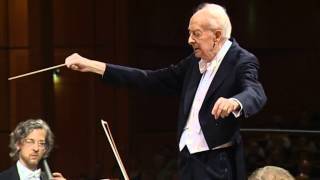꼼꼼하고 빈틈없는 접근, 거장 시대의 감흥
반트가 북독일 방송 교향악단과 녹음한 브루크너의 교향곡 제8번은 그야말로 일생에 단 한번 들을 수 있을까 말까 한 위대한 연주라고 할 수 있다. 반트의 이 음반은 좋다. 정말 굉장하다. 원래 브루크너의 제8번은 내가 무척이나 좋아하는 곡이었는데, 반트의 연주는 비할 데 없는 아름다운, 우주와 같은 광대한 스케일, 표현의 절실함을 저절로 드러내 준다. 삶과 죽음, 물질과 정신, 세계에 대한 경외와 악의 없는 정신적 상승 사이를 대담하게 횡단하는 이 곡의 초고가 세상에 처음 나왔을 당시 작곡가의 제자, 친구 누구 한 사람 이 곡을 이해하지 못했던 것이 당연하게 느껴질 만큼 이 곡은 뛰어나고 연주 또한 흠이 없다.
이 연주에서 반트의 강점은 우선 각각 장면에서 템포와 분위기 설정, 그리고 그 변화의 절묘함을 들 수 있다. 그는 전체의 설계를 위해 부분을 희생시키는 일이 없다. 템포는 트릿함이 없이 생생하게 살아있다. 표정도 조바심이 날 만큼 약화시키지 않고 풍부한 표현으로 전체 연주를 이끌어 가고 있다. 그리고 전체적으로 미세한 여운에서나 큰 흐름에서나 표정의 변화가 놀라울 만큼 풍부하다.

반트라는 지휘자는 사색적인 표현과 깨끗한 여운 처리와 템포나 분위기의 미묘한 변화에 대한 일종의 '거장다움'을 가지고 있다고밖에 말할 수 없는 '무엇'을 지니고 있다. 그런 점에서 보면 그는 오늘날 그 예를 찾아 보기 힘든 대지휘자의 반열에 우뚝 선 존재이다.
반트는 정통적인 독일 지휘자의 면모를 지니고 있다. 가극장에서 밑바닥부터 출발한 그는 쾰른 방송 교향악단, 그리고 지금의 함부르크 방송 교향악단과 많은 시간을 한께 보냈다. 방송국의 오케스트라이기 때문에 전통에서 벗어나 더 객관적인 자세를 취해야 했고 현대곡도 많이 연주하지 않으면 안 되었던 것이다. 그러한 객관적인 접근 방식과 거장 시대의 감각이 무리 없이 동거하고 있다는 점이 반트의 매력이다.
그의 명성은 70년대 후반부터 쾰른 방송 교향악단과 브루크너 전곡을 녹음함으로써 겨우 얻게 된 것이다. 그전까지는 반트의 이름은 아는 사람만 아는 존재였던 것이다. 이러한 점에서는 실력의 전성기와 관계없이 만년에 이르러서야 청중의 인기를 얻게 된 뵘과 닮은 점이 있을지도 모르겠다. 반트는 만년에 연주의 성공과 실패의 기복이 심했던(특히 녹음에서) 뵘과는 달리 일정한 실력을 발휘했다.
이런 점에서 보아도 반트는 확실히 독일의 정통 거장이다. 그는 베토벤, 슈베르트, 브람스, 브루크너 등의 교향곡을 전곡 녹음했는데 여기서도 지극히 독일적인 성향을 드러내고 있다. 그러나 그의 거장성은 무엇보다도 브루크너에 있어서 가장 현저하게 나타나고 있다.
Meticulous and shrewd approach, inspiration of the virtuoso age
Bruckner's Symphony No. 8, recorded by Want with the North German Broadcasting Symphony Orchestra, is truly a great performance that can only be heard once in a lifetime. Want's record is good. That's amazing. Originally, Bruckner's No. 8 was my favorite song, but Bant's performance reveals the unparalleled beauty, the vast scale of the universe, and the desperate need for expression. When the first draft of the song, which boldly crosses life and death, material and spirit, awe of the world, and innocuous spiritual rise, came out, it was natural that no one of the composer's disciples or friends understood the song.
The strength of Bant in this performance is, first of all, the tempo and atmosphere setting in the scene, and the exquisiteness of the change. He doesn't sacrifice parts for the whole design. The tempo is alive and alive without a trittiness. He is leading the entire performance with rich expressions without weakening his expression to the point of impatience. And overall, there are surprisingly abundant changes in facial expressions, either in fine lingering or large flows.
The conductor, Want, has something that can only be said to have a kind of "hugeness" about contemplative expression, clean lingering processing, and subtle changes in tempo or atmosphere. In that sense, he stands tall in the ranks of great commanders that are hard to find today.
Want has the face of an orthodox German conductor. Starting from the bottom of opera house, he spent a lot of time with the Köln Broadcasting Symphony Orchestra and now the Hamburg Broadcasting Symphony Orchestra. Since it was an orchestra of a broadcasting station, it had to move away from tradition and take a more objective attitude, and it was necessary to play a lot of modern songs. The attraction of Vant is that such an objective approach and the sense of the great era live together without difficulty.
His fame began in the late '70s when he recorded the complete works of the Köln Broadcasting Symphony Orchestra and Bruckner. Until then, Bant's name was only known to those who knew it. In this regard, there may be a similarity to Böhm, who only gained popularity in the audience in his later years regardless of the heyday of his ability. Vant showed a certain skill, unlike I saw him, who had ups and downs of success and failure in his later years (especially in recording).
Even in this respect, Want is certainly a German orthodox master. He recorded all symphonies such as Beethoven, Schubert, Brahms, and Bruckner, which also shows a very German tendency. But his virtuosity is most pronounced in Bruckner, among other things.
'Music Story > 지휘자와 오케스트라' 카테고리의 다른 글
| 프랑스 오케스트라 vs 독일 오케스트라 (61) | 2023.11.03 |
|---|---|
| 푸르네(Jean Fournet, 1913~2008) (63) | 2023.10.27 |
| 솔티(Georg Solti, 1912~1997) (51) | 2023.09.27 |
| 오케스트라 음악의 가능성(Possibilities of orchestral music) (45) | 2023.09.23 |
| 지휘자 멘델스존 (4) | 2023.08.31 |



